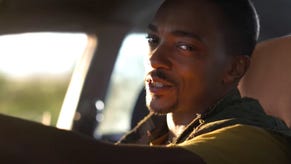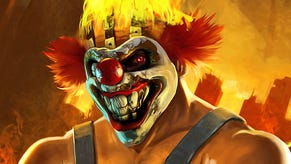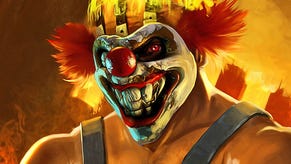Twisted Metal
Mettle detector.
"What is it you guys call me? What it is over there?" David Jaffe is racking his brain for a British slang term he gets labelled with in Eurogamer comments threads. "Wanker?" I suggest, recalling a similar conversation with Cliff Bleszinski about his online relationship with gamers.
"Wanker I like, wanker's kind of fun, but it's something like... Jaffe's a..." It feels inappropriate to venture anything else. "A nob! It's a nob! F*** you, you know! Anyway the point is... There was a valuable point... What was I talking about? Oh, fun!"
Seven minutes with David Jaffe feels like an hour of quality time with anyone else. Wind him up with a question and watch him go, tackling a subject with serious gusto before veering off wildly, losing his way, then just as dramatically swerving back on track.
Jaffe may have a testy, periodically fractious relationship with the industry and the internet, but in person he's warm, funny, smart and wonderfully 'NSFW'. And, as the creative brain behind God of War, a guy who's earned his airtime.
The above tangent comes during an impassioned response on his reaction to Nintendo president Satoru Iwata's now infamous GDC keynote, in which he effectively railed against Apple's App Store gaming strategy, arguing that games development is "drowning".
Having gone around the houses, Jaffe is back on point. "You can't put a value on fun," he insists. "I don' t care if it's 99c or $150 or $1000 over the years in sub fees to an online MMO. Fun is fun, so I think it's an absurd concept to say, this is the criteria, these are the ingredients you have to use to make fun otherwise you can't play. That's bullshit, man."
It's an issue relevant to all game makers and publishers, and Twisted Metal, a PS3 reboot of the other series Jaffe is known for, is no exception. The game – the latest in PlayStation's longest-living franchise no less – began life as a download-only PSN title. Then, somebody in Sony saw greater things ahead and encouraged Jaffe's studio, Eat Sleep Play, to beef it up into a full-price retail product.
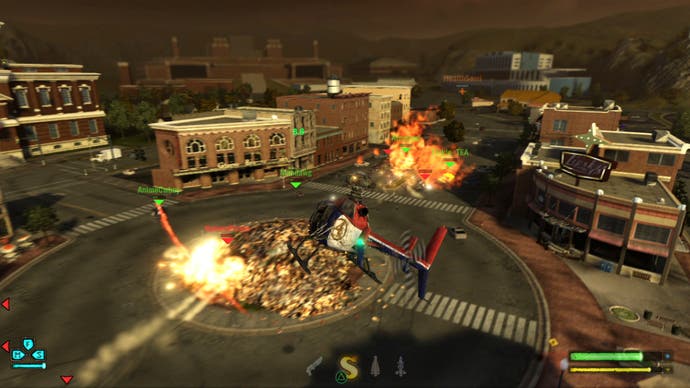
But with an increase in scale and price comes an increase in commercial risk, and with the games market increasingly polarised between mega-marketed triple-A titans like Call of Duty and 59p timesinks of the Angry Birds variety, those releasing games in-between have more reason to be anxious now than in previous years.
And Twisted Metal, for all its many, many millions of sales on PSone and PS2 (with greatest success on home soil in the USA), is making its first appearance in this generation at the most fiercely competitive time of the year at retail: Q4. But somehow you suspect Jaffe relishes the challenge.
"We love Twisted Metal, we love the competition and the multiplayer and we want to bring this to new audiences and new hardware," he says.
There's no sign of single-player at the game's latest hands-on event in Los Angeles, but there's a big chunk of multiplayer on show. And at this stage suffice it to say there are no obvious doubts raised about the promised depth of the experience across its various modes of play.
Jaffe continues: "Our online modes are very deep - you'll hopefully agree that there's a lot of tactics and teamplay and strategy. Our multiplayer local game is very deep in terms of split-screen two- and four-player."
On tactics, teamplay and strategy it is indeed hard to disagree. Although, as Oli noted during last year's E3 hands-on, it remains a little overwhelming at first due to the complexity of the controls.
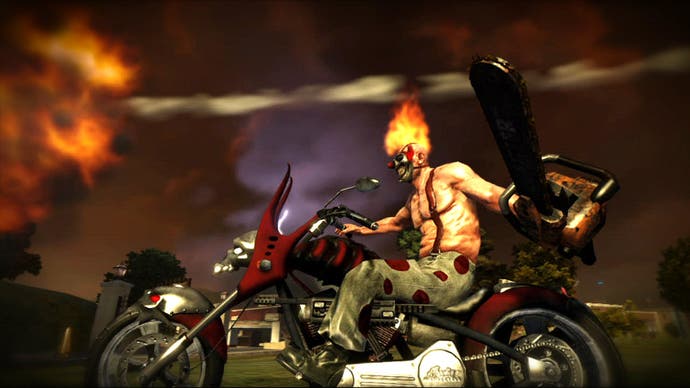
The shoulder buttons, d-pad, both sticks and face buttons, not to mention button combos, are all drafted in to perform essential functions. I learn this the hard way, as it's only towards the end of my gameplay session that I discover the right stick provides a booster reverse, double-tapping square is turbo and L1 plus R1 equals jump.
This is less a criticism of over-complication, since I'd been having plenty of fun regardless, and more a realisation that there's a steep initial learning curve leading towards the game's full suite of fun.
This tallies with Jaffe's positioning of the game, which he's previously compared to a beat-'em-up. The basic controls are the kicks and punches, moving onto the more advanced super-combos. The trick, of course, is making it work at all levels.
Today, he's calling the game "a shooter". "We really do put ourselves in the same category as Bulletstorm, Call of Duty, Quake," he says. "I haven't played the multiplayer of RAGE, but it seems like they might be going in a similar direction." (Check out our RAGE multiplayer preview to compare and contrast.)
This is to draw a distinction between his vehicular combat title, and recent action racers like Blur, Split/Second and MotorStorm, all of which have been commercial failures, despite being "great, great games, amazingly produced games".



